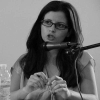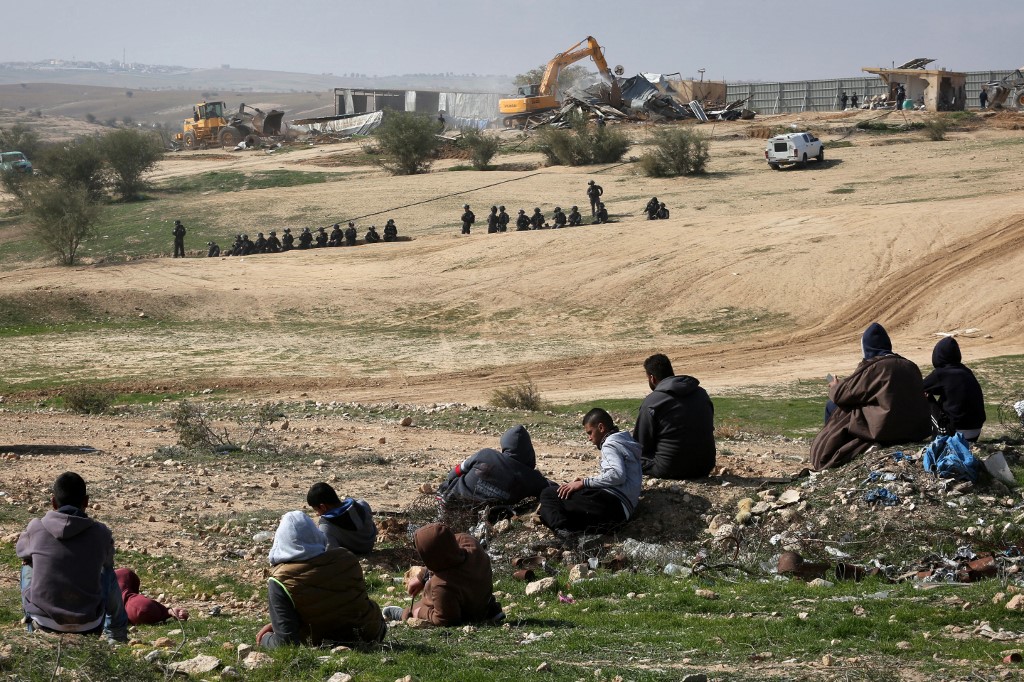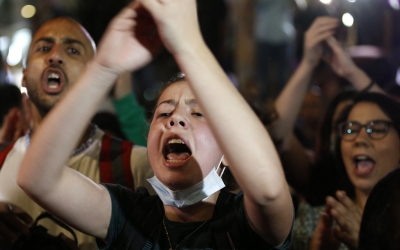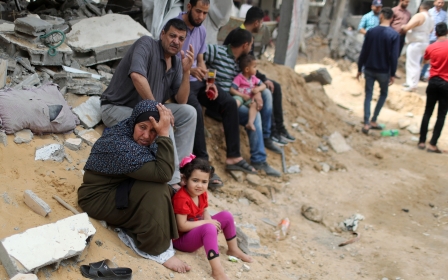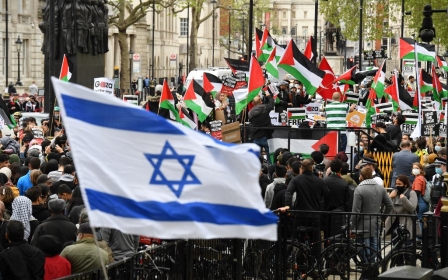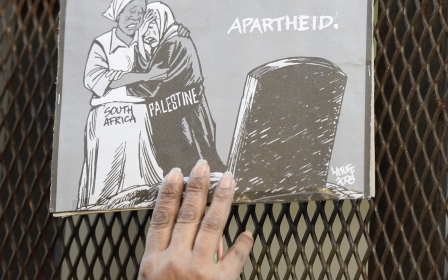From north to south, Palestinians are fighting to reclaim our voice
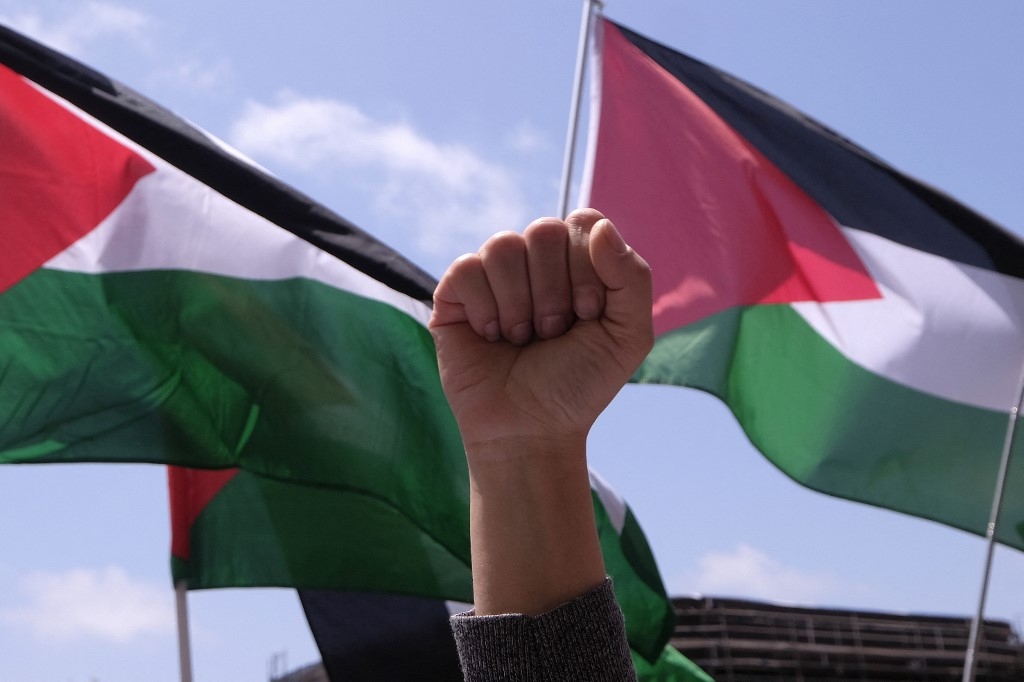
In October 2000, just as the Second Intifada was starting, I was in my home city of Nazareth protesting in the streets. I will never forget the anger that coursed through my body as a group of youths passed by carrying a protester who had been shot dead by Israeli forces.
Today, as I see anger sweep across my homeland, Palestine, from north to south, I want to ensure justice for the sacrifices people are making in order for us to live in freedom. This justice begins with putting these sacrifices in the proper context.
When Palestinian citizens of Israel took part in the Second Intifada and protested in their towns and villages, the narrative was that they were protesting the discrimination they faced in Israel as citizens, as opposed to being part of the uprising against the occupation.
If people are deprived of power and of a voice for decades, they will sooner or later rise up to reclaim it. Now is the time to try to understand this anger
This was because these protests came a few years after the signing of the Oslo Accords, which told Palestinian citizens of Israel that they were no longer a part of the Palestinian liberation cause.
This narrative was echoed by the Palestinian leadership and the international community who refused to look at our issues, from institutional discrimination to racism and apartheid, as an integral part of the Israeli settler-colonial regime.
New MEE newsletter: Jerusalem Dispatch
Sign up to get the latest insights and analysis on Israel-Palestine, alongside Turkey Unpacked and other MEE newsletters
Our problems were framed as “civil rights” issues. No one was interested in listening to the narrative of liberation.
Today, Palestinians are rising up in Akka, Lydd, Ramla, Nazareth, Haifa and dozens of other Palestinian cities and villages across historic Palestine, sending a simple but powerful message: we are all united for one cause, and all attempts to divide us have failed.
Maintaining Jewish superiority
While it might be more comfortable for some to think of Akka or Lydd in a context separate from Jerusalem or Hebron, all are subjected to Israel’s colonial project, which might differ in technicalities, but not in its supreme goal: to maintain a Jewish majority and superiority over Palestinians.
In other words, the goal is to colonise Palestinian lands and drive Palestinians out.
The recent Human Rights Watch (HRW) report A Threshold Crossed: Israeli Authorities and the Crimes of Apartheid and Persecution is important not just for its content, but also for its approach.
Finally, human rights advocates are addressing the various policies affecting all the different parts of Palestine. HRW points to several policies inside Israel that are essentially no different from what is happening in Sheikh Jarrah, Jerusalem, or other areas of the occupied West Bank, noting that “Israeli authorities methodically privilege Jewish Israelis and discriminate against Palestinians”.
Palestinian citizens of Israel, who comprise 19 percent of the population, reside on just three percent of the land. Palestinians lost most of their land after the 1948 Nakba, due to confiscation and displacement by Israel. An estimated 200,000 Palestinians are internally displaced, meaning they might live a few kilometres from their original villages, but Israel continues to deny their right of return, as it does to millions of Palestinian refugees.
As HRW notes, many Palestinian towns and villages are “surrounded by land designated for purposes such as security zones, Jewish regional councils, national parks and nature reserves or highways, which prevent or impede the possibility of their expansion in the future”.
Around 90,000 Palestinian Bedouins in the Naqab live under constant threat of displacement, residing in nearly 40 unrecognised communities that are denied access to education, health services, electricity, and sewage systems. One such village, al-Araqib, has been demolished by Israel 185 times, while tens of thousands of homes in Palestinian towns and villages are at risk of demolition because they lack building permits (which are very rarely granted).
Erasure and ethnic cleansing
Palestinians in “mixed” cities such as Lydd, Akka, Jaffa, and Ramla have been subjected to ethnic cleansing, Judaisation, and the erasure of their Palestinian identity. The village of Dahmash, between Lydd and Ramla, is another Sheikh Jarrah. Its approximately 1,000 Palestinian residents have been fighting against the threat of displacement for two decades. Two Palestinians in Dahmash were killed by rocket fire from Gaza this week, having no shelters to run to when sirens alerted them of an incoming strike.
If these were not enough reasons to be angry, Israel has also developed other direct and indirect strategies of suffocation to make life for Palestinians unbearable. More than a third of Palestinians live in poverty due to decades of Israeli negligence and budgetary discrimination.
Internal violence has become a significant problem in Palestinian areas of Israel, with a proliferation of illegal arms, drug use, and fatal shootings. Hundreds of thousands of Israeli weapons have allegedly made their way into the hands of Palestinians.
But Palestinians do not trust Israeli police - the same officers who kill and brutalise us - to protect us from such crimes. This is a complex trap: we are at the mercy of a system that wants to keep us down or push us out. Imposed socioeconomic and security challenges, including high poverty and unemployment, aim to drain us and keep us too busy to address the broader context.
Yet, one should not underestimate the power of our people to rise up in times of despair. What is happening among Palestinians in Israel today is part of what is happening in Jerusalem and Gaza, and is a continuation of what happened on Land Day in 1976, after the Sabra and Shatila massacre in 1982, during the Second Intifada, and during the “Stop Prawer Plan” campaign in 2013.
This is the culmination of our struggle for freedom, dignity, justice, and the right to return to our lands.
If people are deprived of power and of a voice for decades, they will sooner or later rise up to reclaim it. Now is the time to try to understand this anger, rather than telling people to stay calm and endure further injustices.
The views expressed in this article belong to the author and do not necessarily reflect the editorial policy of Middle East Eye.
Middle East Eye delivers independent and unrivalled coverage and analysis of the Middle East, North Africa and beyond. To learn more about republishing this content and the associated fees, please fill out this form. More about MEE can be found here.


